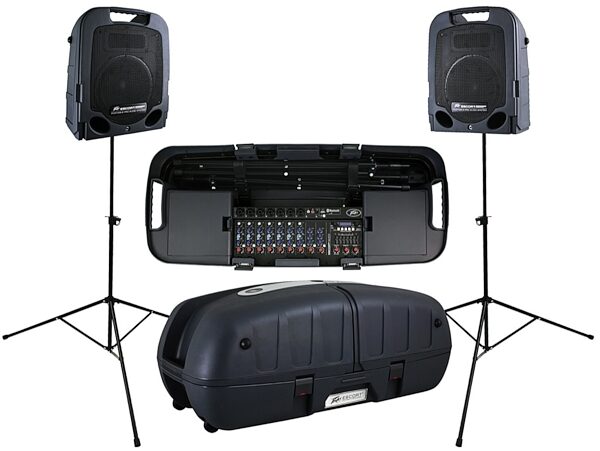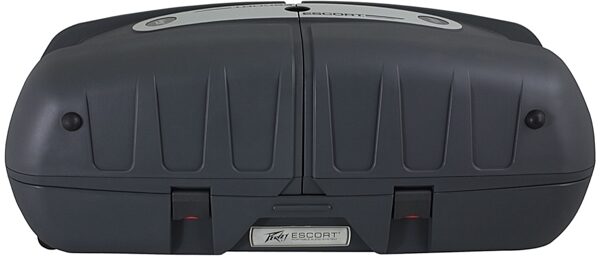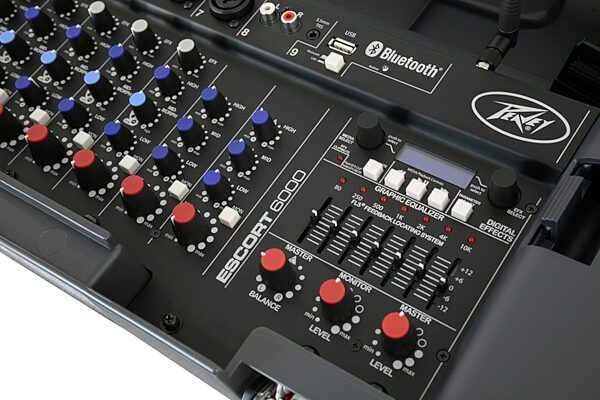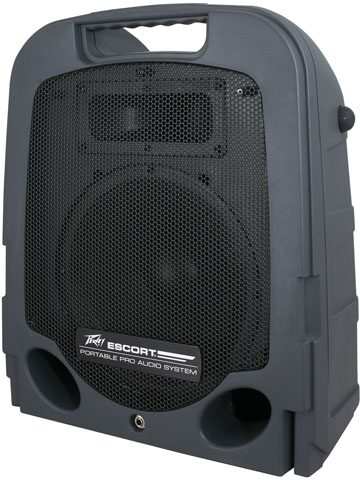Peavey APP Audio Performer Pack Expanding on one of the most successful and most often imitated portable PA systems in the world, the Peavey Escort 6000 integrates the entire PA system into one complete, easy to use, easy to transport, highly reliable, incredible sounding package, making it the perfect choice for schools, churches, DJs, and small music groups.
The Escort 6000 takes the reliability, transportability, and audio quality of the original and combines it with state-of-the-art features such as digital multi-effects, BLUETOOTH, USB MP3 player, Peavey's Midmorph technology, and patented FLS (Feedback Locating System).
The carrying case provides storage for everything needed for sound, including plenty of room for optional accessories such as microphones and cables. In addition to the included pair of folding speaker stands and speaker cables, the case even includes luggage-style wheels to roll the entire system away. No heavy lifting, just heavy audio!
Peavey Escort 6000 Portable Sound System
The Escort 6000 takes the reliability, transportability, and audio quality of the original and combines it with state-of-the-art features such as digital multi-effects, BLUETOOTH, USB MP3 player, Peavey's Midmorph technology, and patented FLS (Feedback Locating System).
The carrying case provides storage for everything needed for sound, including plenty of room for optional accessories such as microphones and cables. In addition to the included pair of folding speaker stands and speaker cables, the case even includes luggage-style wheels to roll the entire system away. No heavy lifting, just heavy audio!
Learn more about the Peavey Escort with this video:
Features:
- 600 Watts (300 x 2)- 7 combination XLR 1/4" inputs
- RCA/3.5 TRS media inputs
- USB MP3 plackback
- Patented FLS (Feedback locating system)
- Digital multi-effects
- Mid-morph
- LCD screen for ease of file playback and effect selection
- Monitor send
- Subwoofer output
- Bluetooth wireless audio playback
- Two folding speaker stands
- Two 15' speaker cables
- Storage compartment for optional accessories
- Convenient… read more
New
https://www.amazon.com/gp/offer-listing/B001FUDJK2/ref=as_li_tl?ie=UTF8&camp=1789&creative=9325&creativeASIN=B001FUDJK2&linkCode=am2&tag=dtwsolutions-20&linkId=b72f5bf4cf7ac81c1c506913d48e8398
NATIONAL QUARTET CONVENTION
Origins and early career
The group was founded as the Golden Gate Jubilee Singers in 1934, by four students at the Booker T. Washington College in Norfolk, Virginia. According to the group’s website,[1] the original members were Willie Johnson (baritone; d. 1980), William Landford (tenor; d. 1970), Henry Owens (second tenor; d. 190) and Orlandus Wilson (bass; 1917–1998); other sources state that Landford and Wilson replaced earlier members Robert “Peg” Ford and A.C. “Eddie” Griffin in 1935.
From 1935, the group sang in churches and on local radio, gaining a regular spot on radio station WIS in Columbia, South Carolina in 1936. They began as a traditional jubilee quartet, combining the clever arrangements associated with barbershop quartets with rhythms borrowed from the blues and jazz like scat singing. They developed a broad repertoire of styles – from Owens’ mournful, understated approach in songs such as “Anyhow” or “Hush, Somebody’s Calling My Name”, to the group’s highly syncopated arrangements in “Shadrach, Meshach and Abednego”. Like The Mills Brothers in popular music, they would often include vocal special effects in their songs, imitating train sounds in songs such as “Golden Gate Gospel Train”. Landford often sang lead, using his ability to range from baritone to falsetto, while Johnson narrated in a hip syncopated style that became the hallmark for the group. Wilson’s bass served as the anchor for the group and Owens harmonized with Landford and Johnson.[citation needed]
In 1937 they moved to station WBT in Charlotte, North Carolina, and soon afterwards won a contract with Bluebird Records. After their first recording session on August 14, 1937, in which they recorded 14 songs in two hours, they were contracted to record 12 tracks per year. In 1938, they were recruited by John Hammond to appear at the first From Spirituals To Swing concert held at Carnegie Hall in New York City, after which their popularity grew. They stayed in New York and were signed up for a residency at the Cafe Society nightclub. As well as performing and recording gospel songs they also recorded some secular songs for RCA Records, who were intending to bill them as “The Four Chocolate Bars”, but the recordings were not released. In 1939, William Landford left the group to form a new group, the Southern Sons; he was replaced by Clyde Riddick (1913–1999).[5]
The 1940s and 1950s
In 1940 the group signed a new contract with Columbia Records’ subsidiary Okeh label, and shortened their name to the Golden Gate Quartet. They soon had a nationwide radio program and the opportunity to sing at Franklin Delano Roosevelt’s inauguration in 1941, becoming the first black musical group to sing at Constitution Hall and later performing several times at the White House. They continued to be popular during World War Two, making several appearances in Hollywood films and singing secular music, including some unique popular front songs such as “Stalin Wasn’t Stallin'” that mixed humor with political commentary. The Quartet appeared in films such as Star Spangled Rhythm (1942), Hit Parade of 1943 (1943), Hollywood Canteen (1944), and the Danny Kaye film A Song Is Born (1948). In the latter film, they performed the songs “Joshua Fit the Battle of Jericho” and part of “A Song Is Born” with Louis Armstrong and Virginia Mayo.
Johnson was called into the US Navy in 1943, followed by Wilson in 1944; they were temporarily replaced by Cliff Givens – who later left to join firstly The Ink Spots and then Billy Ward and His Dominoes – and Alton Bradley. The group moved first to the main Columbia record label and then, in 1948, to Mercury Records. Johnson left in 1948 to join The Jubalaires, and was replaced by Orville Brooks (1919-1997).
The quartet lost their pre-eminent position in gospel music after the war, when they faced competition from the newer hard gospel quartets. They continued in their old style, offering sharper political commentary in songs such as “God’s Gonna Cut You Down”, but losing much of their audience to quartets such as the Dixie Hummingbirds and the Soul Stirrers. Henry Owens left in 1950 to become a preacher and solo artist. Alton Bradley returned to replace him, but then left in 1952 when he was replaced by Eugene Mumford (1925-1977), previously of The Larks.
The Golden Gates revived their career in 1955, however, when they toured Europe for the first time, where they became widely popular. The group moved to Paris in 1959 and has continued touring, primarily in Europe, since then. During his stint in the US Army, in Germany, Elvis Presley, who was a huge admirer of their work since his early childhood, visited them backstage at “Le Lido” (not “Le Lido” but “Le Casino de Paris” presenting likewise a showgirl revue “Plaisirs de Paris” led by Line Renaud, in which the Golden Gate Quartet performed the opening act; the encounter took place in Line Renaud’s dressing room on January 12, 1960) in Paris, and stayed to watch their entire show, staying also with them at the hotel “Prince de Galles” (Elvis didn’t follow them to their hotel as suggested : he and his soldier friends were already staying at that same hotel, just like he did on his two previous getaways in Paris in June and July 1959. Reservations, limousine, etc. were managed by the local representatives of his record company). Presley recorded a version of their popular “Swing Down Chariot” that appeared on his His Hand in Mine gospel album. During this time there were further personnel changes: Orville Brooks left and was replaced by Franck Todd and later in turn by Caleb Ginyard (1910-1978), and Eugene Mumford was replaced by Clyde Wright (born May 1, 1928, Charlotte, North Carolina).
Since the 1950s, the group has been primarily based in Europe. They toured widely in the late 1950s, including US State Department-sponsored tours around the world. In 1959, the group started a two-year residency at the Casino de Paris.
Later activities
The group made their first tour of Africa in 1962, and during the early 1960s gradually expanded their accompanying band to incorporate guitar, piano, bass and drums. Through the 1960s they toured widely in Europe, with a long-established line-up of Orlandus Wilson, Clyde Riddick, Caleb Ginyard, and Clyde Wright. In 1971, Ginyard and Wright left, and were replaced by Paul Brembly (the great-nephew of Orlandus Wilson) and Calvin Williams.Wright returned to the group in 1985 to replace Williams, who returned to the US.
Bill “Willie” Johnson worked with Eugene Mumford and Cliff Givens in his own version of The Golden Gate Quartet in the late ’70s out of the Los Angeles area, most notably appearing on Ry Cooder’s “Jazz” album, and appearing with Cooder in his 1978 “Soundstage” performance, with Givens, Pico Payne, and Jimmy Adams (though Johnson didn’t use the group name in these particular appearances).
The group undertook a 60th anniversary world tour in 1994. Riddick remained with the group until his retirement in 1995, and Wilson, the last surviving member of the original group, until his death in 1998. Riddick was replaced by Frank Davis. Wright was replaced by Charles West (Nephew to Wilson) of Portsmouth, VA. The position of bass singer has in recent years been filled by Thierry Fred Francois, Richard Phillips, and, since 2005, by Anthony Gordon.
In 2007, Bro. Peterson connected with New Bethlehem Missionary Baptist Church, 1824 Prospect Street, Jacksonville, FL as their musician and later became their Minister of Music.
QUARTET CONVENTION
The Canton Spirituals are an award-winning gospel recording group and are regarded as pioneers in the genre of traditional gospel music.
Founded in Canton, Mississippi in 1943, the original Canton Spirituals were Eddie Jackson, Theo Thompson, Roscoe Lucious and founder Harvey Watkins, Sr. (December 5, 1929-November 16, 1994). Today, the group is fronted by Watkins' son, Harvey, Jr., and consists of Billy Voss, David Curry, Merlin Lucious, Alton Hollis and Maurice Morgan.
Years Active
1943 – present (78 years)
Founded In
Canton, Madison County, Mississippi, United States
The Canton Spirituals are an award-winning gospel
Darrell McFadden And The Disciples, known as one of the hardest working Groups/Bands in the land (Called “DMD” by their fans) have a fresh but classic sound that stays close to traditional quartet roots while exploring contemporary musical styles. Jazzing up quartet has been in the group’s lifeblood from the start.
DMD has shared the stage with many gospel legends over the last 20 years and share a very special relationship with the veterans and the rising talent within the quartet music genre. Seen as innovators, inspiring many young artists who have taken to their unique urban approach to the traditional style of quartet music. DMD has performed at many conventions and festivals including: The GMWA, The Jackson Music Awards, The Stellar Awards, The American Gospel Quartet Convention, The New Orleans Jazz Fest, The Chicago Gospel Fest, The Clarksdale Blues and Art Festival, and many more, as well as earning two Stellar Award Nominations.
“We want to take quartet music to a new stage of recognition and popularity. A lot of people have lost touch with it, aren’t even familiar, or have an inaccurate impression about it. We want to show them that it can still be current, modern and something they can latch onto and enjoy. But our greatest purpose is just to
Lead Singer For The “Supreme 7
Bro. Antwione Peterson, lead singer of the gospel group “Supreme 7” and Minister of Music at New Bethlehem Missionary Baptist Church passed Friday, September 3, 2021 in a local hospital.
Bro. Peterson and the “Supreme 7” Gospel Group recorded and released several albums to include “From The Heart”, “Another Yes” and many CD’s.
The “Supreme 7” was rated 5 stars by Amazon.comMusic. “Formed in 1995 by Antwione Peterson, The Supreme 7 is one of the best groups in Gospel music today. Featuring former members of The Gospel Keynotes and Fantastic Vionlinaires, this group represents the best of the past and present in Gospel Quartet music. Initially started in Philadelphia and relocated to Jacksonville, Florida with remaining founding member Antwione









No comments:
Post a Comment